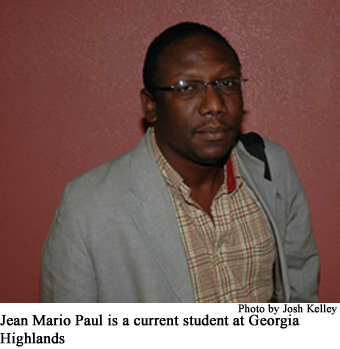FEATURES |
| Be sure to check out this other Feature article: |
GHC student is a political refugee of the Haitian coup d’etatBy Leanna Gable Jean Mario Paul is a current Georgia Highlands student and a former journalist in Haiti. Paul fled from Haiti to America after being arrested and imprisoned for reporting after the Coup d’etat that shattered the image of Haitian democracy on Sept. 30, 1990. Paul has written two books in French, Le Prix de la Parole and Haiti: Un Guache Contre La Revulution with Aldor Toko. He has also been awarded the Louis M. Lyons Award for Conscious Integrity in Journalism by the Neiman Foundation at Harvard and the first Freedom of the Press Award by the New York Association of Black Journalism. The coup d’etat was a militant uprising against the democratically elected president of Haiti, Jean-Bertrand Aristide. The militant group felt that Aristide was too close to the lower-class of people, the majority of Haitians. During the coup, 5,000 Haitians were killed, 10,000-15,000 were imprisoned and more than 20,000 fled to the United States for political asylum. During the coup d’etat, Paul reported from Petit-Goave, Haiti, a short distance from Haiti’s capital of Port-au-Prince. He was a correspondent for Radio Antilles, a station that was forcibly closed by the militant group because of the information being aired during the coup. Paul was arrested for his role in reporting the story and placed in a Port-au-Prince prison for six months, where he sustained regular beatings and mistreatment. Paul was eventually released, and after the militant group remained in power for two years, the United Nations reinstated Aristide as the president. When he was released, Paul fled from country to country before coming to the United States for political asylum. He then continued to report because “to give up journalism would mean that I learned the lesson they tried to teach me,” says Paul. Paul says that it was “hard to adapt” to the change of language and culture here, but he cannot return home because he still feels that it would be unsafe. Most of his family fled shortly after the coup, and he has not seen his mother for 14 years. He seeks the Haitian community that he knows exists in this country. Currently, Paul is working on a book in English as well as a film, also in English. He continues to strive to improve his language skills and hopes to publish very soon. |
